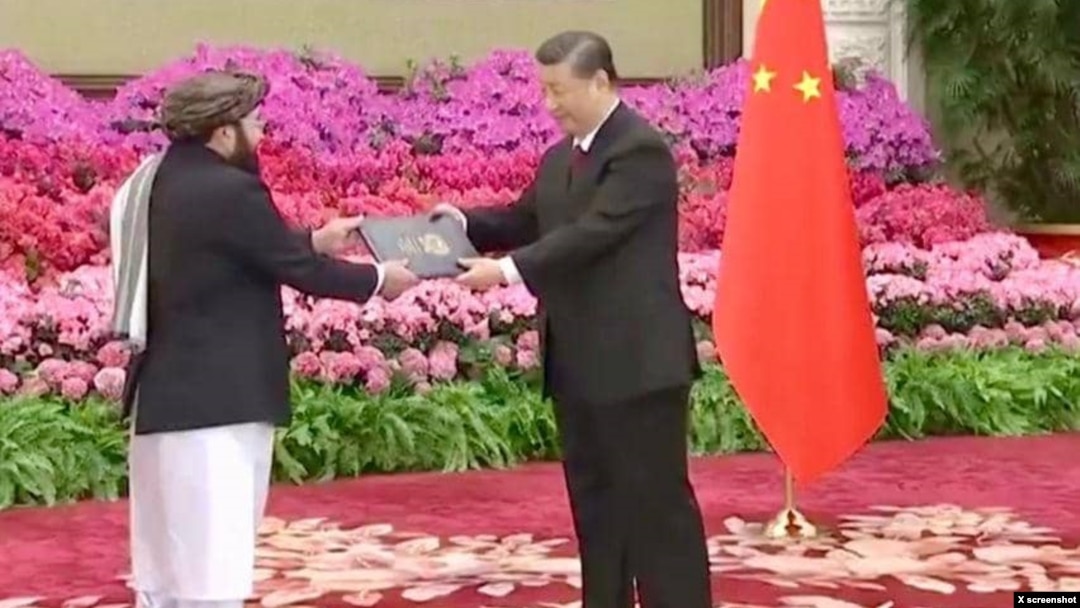Chinese President Xi Jinping’s acceptance this week of ambassador credentials from the representative of Afghanistan amounts to the first official recognition of the interim Taliban government by a major nation, some analysts and former diplomats say.
Xi welcomed Asadullah Bilal Karimi, the Taliban-appointed Afghan ambassador, in a formal ceremony at the Great Hall of the People, along with envoys from Cuba, Iran, Pakistan and 38 other countries, who also presented their credentials.
Wang Wenbin, a spokesperson for China's Foreign Ministry, evaded a direct question at a briefing Wednesday as to whether China now recognizes the Taliban administration in Kabul.
But, he said, "China believes that Afghanistan should not be excluded from the international community," adding that it was normal diplomatic protocol for China to receive and accredit an ambassador from the interim Afghan government.
"China has understood what the rest of the world has not," Zabihullah Mujahid, the Taliban's chief spokesperson, said Tuesday at an event on the social media platform X.
"We are not in a unipolar world," Mujahid said, calling on Russia, Iran and other countries to take similar steps and upgrade diplomatic relations with Kabul.
Xi told the new ambassadors that China is seeking deep friendship and mutually beneficial cooperation with their countries, Chinese state news agency Xinhua reported.
SEE ALSO: Taliban Sell Afghanistan's Mines Despite SanctionsDiplomatic recognition is not always formally declared, and diplomats contacted by VOA offered differing opinions on whether Beijing's action constitutes such recognition.
Matthew Miller, spokesperson for the U.S. State Department, said whether Beijing has officially recognized the Taliban regime is for Chinese officials to clarify.
"I have seen some comments from them to the contrary," Miller told VOA on Tuesday. For the United States, Miller said, the Taliban's relationship with the international community depends on their actions.
"China may be getting ready to break ranks and take the final technical step either within the U.N. system or outside of it through a bilateral initiative," Omar Samad, a former Afghan ambassador, wrote to VOA.
Javid Ahmad, Afghan ambassador to the United Arab Emirates under the former Afghan government, called the Chinese move an act of recognition.
"The signal is unmistakable, as no head of state would accept ambassadorial credentials unless they recognize the government. In this instance, the Chinese leadership is treating the Taliban envoy in the same manner as other ambassadors, a clear indication of recognition," Ahmad told VOA.
While China's acceptance of Karimi's credentials marks a significant step, it remains an isolated one. No other major nation has recognized the Taliban's Islamic Emirate of Afghanistan, and the United Nations has repeatedly denied their requests for representation at the world body.
The United States and European countries have imposed economic and political sanctions on Taliban leaders and entities, accusing them of grave human rights violations, particularly concerning women's rights to education and work.
Since reclaiming power in August 2021, the Taliban have steadily established control over many Afghan diplomatic missions, primarily in neighboring countries. The group now oversees embassies in at least 14 countries, including Pakistan, Uzbekistan and Turkmenistan.
Some countries, including Russia, China and Iran, have maintained their embassies in Kabul.
Last week, Russian Foreign Minister Sergey Lavrov told reporters in New York that Moscow had not recognized the Taliban regime because of political and human rights considerations.
"We, as the rest of the U.N. members, do not officially recognize the Taliban," Lavrov said through an interpreter.
Last month, the U.N. Security Council authorized the secretary-general to appoint a special envoy for Afghanistan to facilitate coordinated international engagement with de facto Taliban authorities.
SEE ALSO: UN Calls for More, Direct Engagement With TalibanTaliban officials have objected to the appointment of the new envoy, saying the U.N. should stop treating Afghanistan as an anomaly within the international community.
VOA correspondents Margaret Besheer and Nike Ching contributed to this article.


